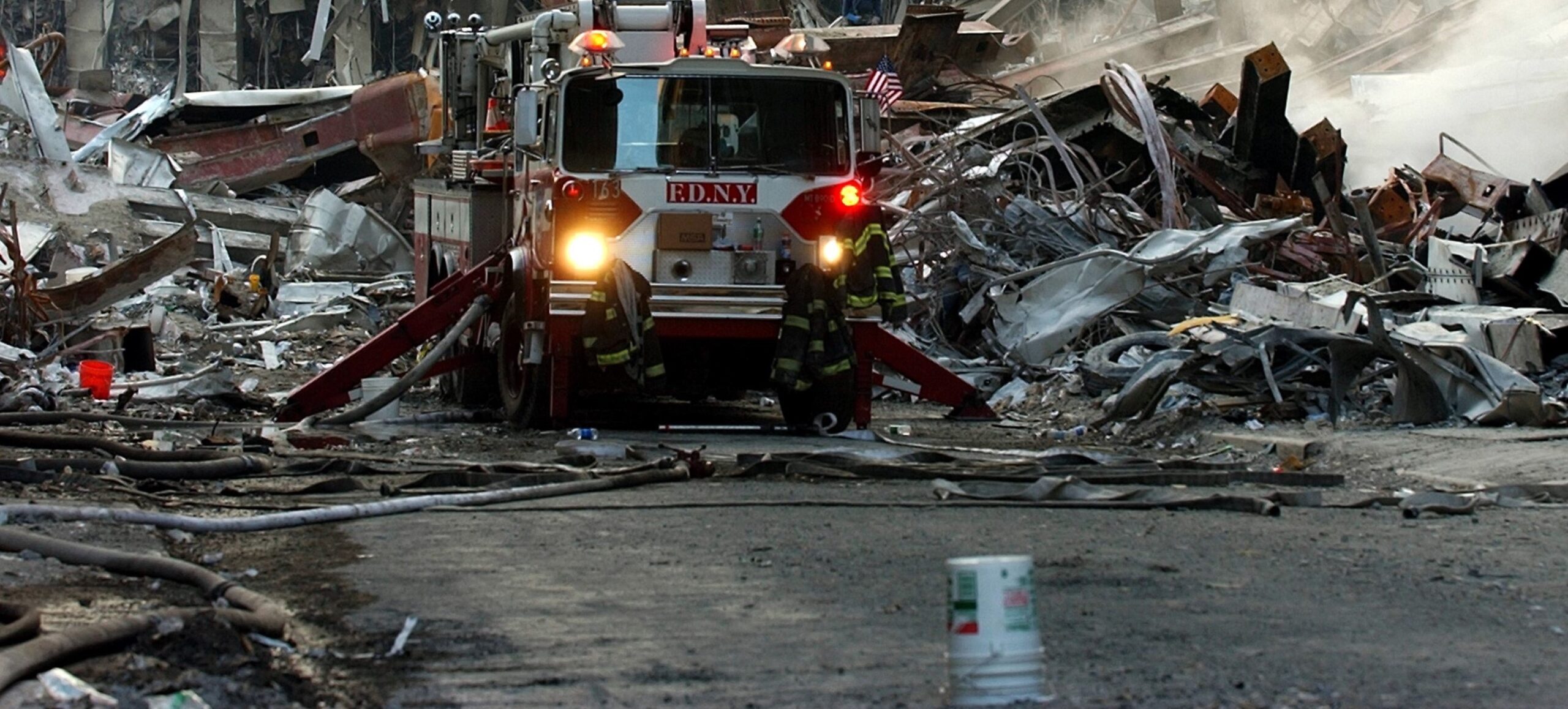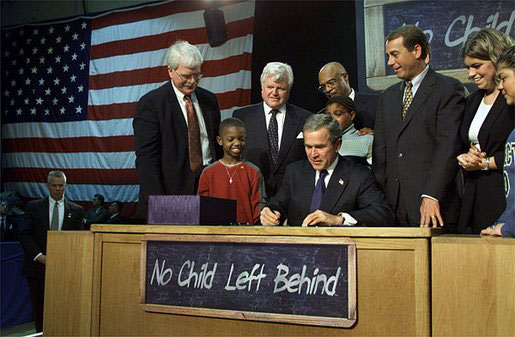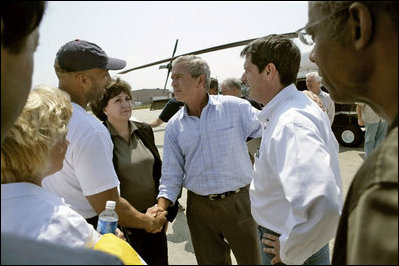
George W. Bush
George W. Bush
Only twice has a son followed his father into the presidency. John Quincy Adams was the first president to succeed his father. George W. Bush, the son of George H.W. Bush, was the second. The younger Bush, who had previously served as governor of Texas, came into office pledging to govern as a “compassionate conservative,” who would offer flexible responses to the nation’s domestic challenges.

His major domestic achievement was an educational reform act known as “No Child Left Behind,” His calls for immigration reform and a guest worker program, however, failed in Congress. His major domestic failure involved his administration’s handling of the aftermath of Hurricane Katrina, the costliest natural disaster in American history, which left 1,836 dead and nearly destroyed the city of New Orleans.
Like Presidents Truman and Johnson, President Bush became bogged down in an overseas military conflicts without victory in sight. At first, the signs were encouraging. Bush’s simple, unflinching eloquence and his quick toppling of the Taliban government in Afghanistan rallied the nation. But the administration decided to focus not simply on Al Qaeda, but on toppling Saddam Hussein, the president of Iraq, claiming, mistakenly, that he was developing weapons of mass destruction that posed an imminent threat to the United States.
In a sharp break with American foreign policy tradition, the Bush administration advocated a policy of preventative war. Critics, and some intelligence experts, warned that an American invasion could spark a long and bloody civil war among Iraq’s fierce religious and ethnic rivals, reports that have since proved true. At the same time, some military officials cautioned that pacifying postwar Iraq would require hundreds of thousands of American troops

On March 20, 2003, the United States and a coalition of Allies went to war against Iraq, one of the countries along with Iran and North Korea that President Bush regarded as part of an “axis of evil.” The invasion did not receive United Nations’ backing, which might have provided greater international legitimacy to take out Hussein’s regime. Iraq’s military, severely weakened during the 1991 Persian Gulf War, quickly collapsed before coalition forces. On May 1, 2003, Bush told the American people that “major combat operations in Iraq have ended.” At that juncture, 137 American military personnel had been killed.
More than three years after toppling Hussein’s government, U.S. and coalition troops were still fighting insurgent forces, made up of remnants of the old regime, disgruntled Sunni and Shiite Iraqis, and terrorists who had infiltrated the country. By March 2006, more than 2,300 American troops had died in Iraq.
In 2004, as in the election of 2000, a single state decided the outcome of the presidency, based on the distribution of electoral votes. Ohio’s 20 votes gave Bush the margin of victory over Sen. John Kerry of Massachusetts. Still, with a 3.5 million popular vote margin, Bush won the first outright majority in the popular vote for president in sixteen years, and the Republican Party succeeded in expanding GOP majorities in the House and Senate.
The Republicans succeeded by galvanizing more supporters than did the Democrats, especially among religious conservatives concerned about moral values. It seemed likely that the decision by the Massachusetts Supreme Court to legalize gay marriage—which led eleven states to vote on initiatives banning gay marriage—helped the Bush campaign mobilize religious voters.
President Bush’s top priority in his second term was to end the insurgency in Iraq. He also announced an aggressive domestic policy agenda that included promoting energy production and allowing younger workers to divert part of their Social Security taxes into personal investment accounts, making permanent the $1.9 trillion tax cuts he won in his first term. Although he had several successes, including a revamping of bankruptcy laws, placing restrictions on class-action lawsuits, and energy legislation, many of his other proposals, especially his plan to reform Social Security, faced stiff resistance from Democrats in Congress.
His presidency ended with the economy entering the sharpest economic decline since the Great Depression. The unemployment rate jumped from five percent in 2008 to ten percent in late 2009, the stock market plunged 57 percent, and housing prices fell thirty percent.
No single factor triggered the financial crisis. Low interest rates allowed housing prices to soar and led to irresponsible lending on the part of banks and borrowing among consumers. When housing prices began to fall in 2007, there was a huge number of defaults on mortgages. Exposure to these bad mortgages led, in turn, to the failure of two investment banks, Bear Stearns and Lehman Brothers, prompting a liquidity crisis, as banks dramatically reduced lending.
Underlying causes of the crisis included the emergence of a “shadow” banking system, a largely unregulated market in exotic financial instruments such as credit-default swaps and collateralized debt obligations, misjudgments by credit rating services about the risks of mortgage-backed securities, a lack of transparency about the amount of risk assumed by banks, and flawed incentives at financial firms that encouraged traders to take excessive risks.
How Americans Remember Their Wars
Some wars are largely forgotten—no matter their larger political significance. The Mexican War, which added a third to the nation’s size, is overshadowed by the Civil War. The Spanish American War, which marked the country’s emergence as a world power, is outshined by World War I. The Korean War, the Cold War’s first hot war, is overshadowed by World War II and Vietnam.
Similarly, some individual battles or incidents—including the Alamo, Gettysburg, and Pearl Harbor—have become cultural touchstones, while others that were also consequential, are overlooked. We remember the 9/11 attack on the World Trade Center, but tend to forget the attack on the Pentagon that took place on the same day.
Memory is selective. Some incidents loom large. Others fade into forgetfulness.
What explains why certain conflicts are remembered while others recede into the past?
Americans tend to remember traumas: wholly unanticipated attacks, like those that occurred on December 7, 1941 or on September 11, 2001, that violate international law and standards of justice and fair play. For many Americans, the Vietnam war was a trauma writ large, not only in the number of American deaths, but in the ways that it conflicted with the nation’s self-image as defender of freedom and promoter of democracy and human rights.
Conversely, Americans often tend to forget wars with ambiguous outcomes, which was certainly the case of the War of 1812 and the Korean War.
Wars that are morally ambiguous have also receded from memory. The Mexican War, with its seizure of land from Mexico, and the Spanish American War, with its conquest of Spanish possessions, raise difficult questions about the motives behind American foreign policy.
The Korean War poses particularly difficult moral issues. After all, it was the North Koreans leaders who were at the forefront of resistance to Japanese occupation of the Korean peninsula before and during World War II. Meanwhile, the United States helped established a post-World War II government in South Korea that included many individuals who had collaborated with the Japanese. By some serious estimates, between 100,000 and 200,000 Koreans died at the hands of the South Korean government or U.S. occupation forces before the outbreak of the Korean War following a North Korean invasion of the South.
In 2002, 93 percent of Americans said invading Afghanistan was the right decision. By 2014, the figure had fallen to 51 percent in favor and 41 percent opposed.
When the Iraq war was launched in 2003, three-quarters of American favored the decision to go to use military force. In 2014, half the popular surveyed considered the war a mistake. Only 38 percent expressed support for the war. In every major war since World War II, Americans initially felt that American involvement was a good idea, only to see support erode over time. Take the Korean war: In August of 1950, Gallup found that by 65-20, Americans thought it was worth it. By January of 1951, a plurality of 49-38 said it had been a mistake. The war lasted two and a half more years. Or consider the Vietnam war. In August of 1965, by 60-24, Americans thought it was not a mistake to get involved militarily in that country. By October of 1967 a plurality of 17-44 said it had been a mistake.